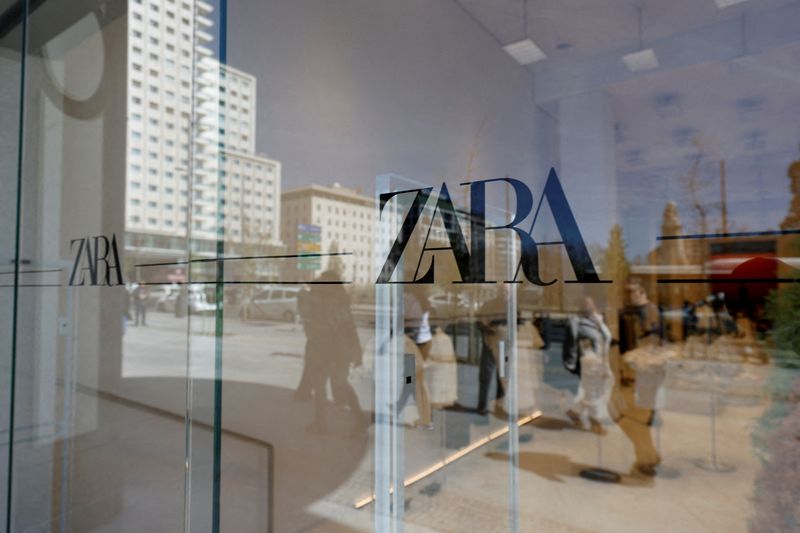By Corina Pons
MADRID (Reuters) - Fashion giant Zara's owner Inditex (BME:ITX) is expected to report bumper first-quarter earnings next week, benefiting from raising prices more than rivals without damaging its sales, analysts said.
As a cost of living crisis intensifies across the region, Europe's retailers are facing a tricky balancing act between passing on rising supply chain costs to consumers and ensuring that their products stay affordable.
The Russia-Ukraine conflict and COVID-19 lockdowns in China have added to pressures. But Inditex, best-known for the fast-to-market Zara brand which provides 71% of its sales, has staged a faster recovery than most, analysts said.
The company was still well-placed to take market share because its prices remained competitive and consumers liked its rapid output of new fashion lines, RBC analyst Richard Chamberlain said in a research note.
"We expect Inditex's sales outperformance to widen in a downturn, as it did in the financial crisis of 2008 and 2009," he said. "Consumers that have been stuck at home for two years are looking to replenish their wardrobes."
Zara has lifted its starting prices by 10% or more from a year ago each month since January, according to UBS research. In April, its starting prices rose by an average 18.5%, the data showed. The research monitors prices on Zara's websites across 12 key markets.
In contrast, average retail prices across European apparel brands, including its closest rivals H&M and Zalando, rose 4.2% in April, the research showed. Euro zone inflation was at a record high of 7.4% that month, according to the European Union's statistics agency.
Inditex reports first quarter results on June 8.
Analysts are expecting a 93% rise in net profit to 812 million euros ($866 million), according to Refinitiv data. Sales are expected to rise by 27% to 6.2 billion euros. Last year's performance was affected by store closures during the pandemic.
Inditex halted operations in Russia, closing online operations and 502 shops after Moscow's invasion of Ukraine and the imposition of Western sanctions. The Russian market accounted for 5% of its sales growth from Feb. 1 to March 13 this year, the company said.

UBS expects Inditex to continue increasing prices and sales during the second quarter. An ongoing recovery in Britain, Europe and the United States that will ease the lack of Russian sales and any further COVID restrictions in China, it said. Sweden's rival H&M also said in March it would need to raise prices this year, but said its plan would be for price hikes to be smaller than its competitors.
($1 = 0.9375 euros)